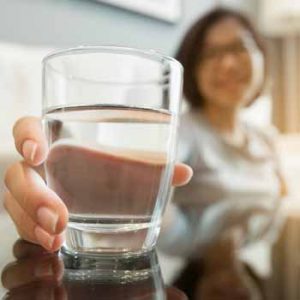
More evidence that low-calorie sweeteners are bad for your health
Studies show that artificial sweeteners can raise the risk of hypertension, metabolic syndrome, type 2 diabetes and heart disease, including stroke.

Natural Health News — Does everyone really have to drink 8 glasses of water every day? According to new research maybe not.
In a recent study Australian researchers claim to have discovered the mechanism that regulates fluid intake in the human body and stops us from over-drinking, which can cause potentially fatal water intoxication.
The study challenges the popular idea that we should slavishly drink eight glasses of water a day for health.
The study in the Proceedings of the National Academy of Sciences showed that a ‘swallowing inhibition’ is activated by the brain after excess liquid is consumed, helping maintain tightly calibrated volumes of water in the body.
» Water is necessary for health but you can get too much.
» A new discovery from Australian researchers shows that when the body has had enough water, the brain switches on a ‘swallowing inhibition’ mechanism intended to stop you drinking too much.
» This mechanism helps keep water levels in the body tightly regulated.
Too much effort?
Building on a previous study, the researchers asked participants to rate the amount of effort required to swallow water under two conditions; following exercise when they were thirsty and later after they were persuaded to drink an excess amount of water.
The results showed a three-fold increase in effort after over-drinking.
“Here for the first time we found effort-full swallowing after drinking excess water which meant they were having to overcome some sort of resistance,” said lead author Associate Professor Michael Farrell from the Monash Biomedicine Discovery Institute
“This was compatible with our notion that the swallowing reflex becomes inhibited once enough water has been drunk.”
The researchers used functional magnetic resonance imaging (fMRI) to measure activity in various parts of the brain, focusing on the brief period just before swallowing.
The fMRI showed the right prefrontal areas of the brain were much more active when participants were trying to swallow with much effort, suggesting the frontal cortex steps in to override the swallowing inhibition so drinking could occur according to the researchers’ instructions.
Follow your thirst
“There have been cases when athletes in marathons were told to load up with water and died, in certain circumstances, because they slavishly followed these recommendations and drank far in excess of need,” he said.
Drinking too much water in the body puts it in danger of water intoxication or hyponatremia, when vital levels of sodium in the blood become abnormally low potentially causing symptoms ranging from lethargy and nausea to convulsions and coma.
Dehydration, of course, brings its own problems (particularly in the elderly, who often don’t drink enough) but according to Associate Professor Farrell: “If we just do what our body demands us to we’ll probably get it right – just drink according to thirst rather than an elaborate schedule.”

Please subscribe me to your newsletter mailing list. I have read the
privacy statement